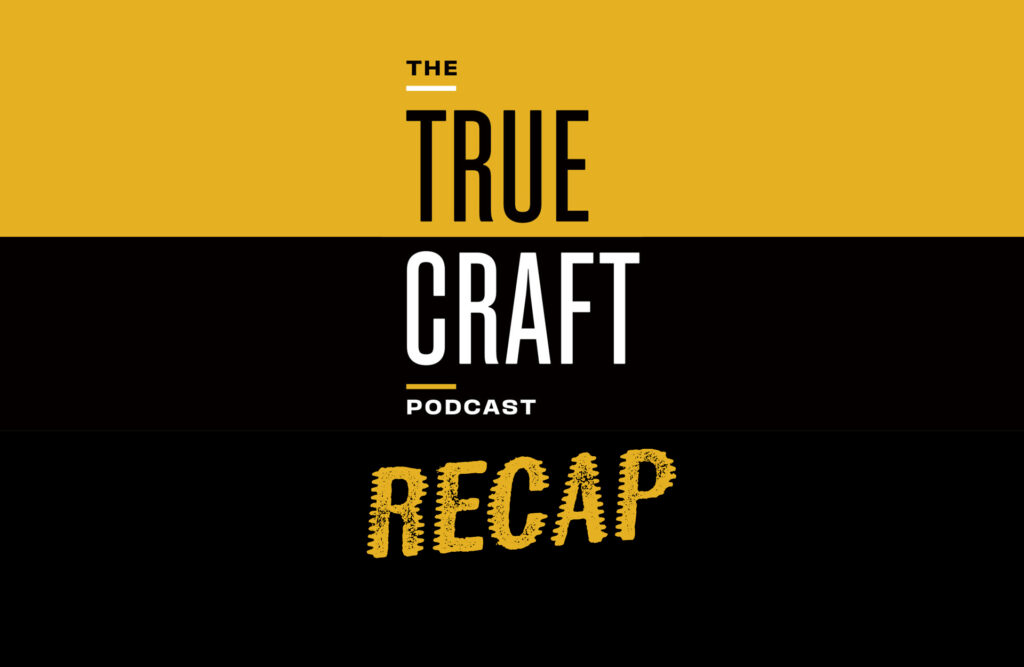
November. ✅
This month on the The True Craft Podcast we saw a variety of topics. We touched on the idea of brand expansion beyond the walls of a brewery, (re)finding the purpose of being in business, and the potential that breweries have when it comes to the experience economy and creating memorable moments for their customers.
As we enter our final month of the year and look to 2024, I hope the final few episodes of 2023 provide some inspiration.
Let’s get into it!
Episode 66: Hiring, Humble Pie, & AI with the Co-Founders of Fernson Brewing Company
Episode 67: Industry Maturation & The Innovation Dilemma with Joel McClosky of Four Saints Brewing
Episode 68: The Portfolio Puzzle with Ben Hugus of Ursa Minor Brewing
Episode 69: The Essentiality of Experience with Mark Bjornstad of Drekker Brewing
Get into the experience business
It should come as no surprise that people enjoy making memories, having impactful experiences, and sharing them with others. But what might be more of a surprise is how the craft beer industry is positioned to incorporate these meaningful and fun experiences into their local communities.
When we sat down with Fernson Brewing Company early this month, Blake Thompson and Derek Fernholz, Co-Founders & Co-CEOs, spoke on how they’ve begun making business decisions that expand their brand into experiences that are happening throughout their community in Sioux Falls, SD.
Fernson Brewing Co. recently sponsored the Sioux Falls Golf Tour and the inaugural Skip Day Summer Smash pickleball tournament, which saw 250 players from around the midwest fly to Sioux Falls to compete. The brewery has even started their own pickleball-inspired Hard Seltzer brand called Skip Day.
This idea of investing in experiences was heavily echoed in our conversation with Mark Bjornstad, President & Co-Founder of Drekker Brewing out of Fargo, North Dakota.
Seeing themselves more as an ‘experience’ company than a ‘beer’ company, Drekker Brewing not only serves their local community, but have essentially created their own neighborhood filled with experiences for patrons to enjoy.
The brewery started in a 15,000-square-foot locomotive repair building built in the 1880s. They would eventually build on that existing massive footprint to create a one-of-a-kind experience:
The experience economy is alive and well and it can extend beyond weekly trivia nights. We are hearing more often that consumers need a reason besides great beer to leave their homes and shell out cash, and what better way than providing an experience that won’t be easily forgotten.
Use the basics to your advantage
As a brewery transitions from a home-brewing passion project to the business realm, an essence of market awareness needs to be present in order to survive. However, trending fads can often lead to an exhausted brewery team scrambling to concoct the next best brew.
Instead of riding the waves of the next trend, Joel McClosky with Four Saints Brewing Company brought up the idea of using customer expectations to your advantage while directing their focus on what you do best (e.g. quality tasting beers that you can quickly turn out):
Don’t stop learning
When we sat down with Ben Hugus, CEO & Co-Founder of Ursa Minor Brewing out of Duluth, Minnesota, brewery health and their brewing experimentation with THC was just the tip of the iceberg in our conversation.
As the discussion continued on to the topic of craft’s future, there were a plethora of questions that seemingly had no answers:
And although these questions might be be overwhelming, Ben offered a solution in the same breath that he and his team are utilizing:
The idea of actively learning isn’t new, but it’s worth remembering. Whether it’s self-led via books and podcasts, like Ben has been doing for years, or participating in group brainstorming and discussions, actively learning is one way to potentially future-proof the craft industry. You’ll have a pulse on the industry, but perhaps more importantly, you can make well-informed business decisions.
That concludes November’s edition of The True Craft Podcast Recap!
December brings us five Fridays, which means five episodes to round out the year. If you haven’t already subscribed, you can do so here to listen to episodes as they’re released every Friday morning.